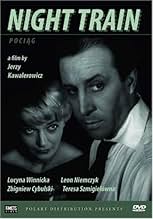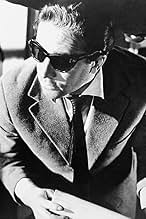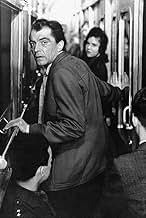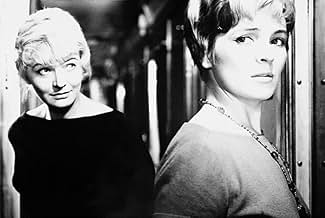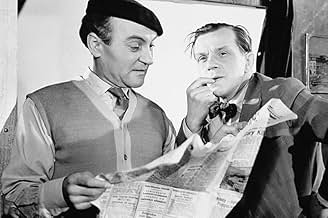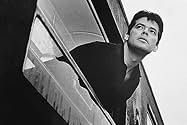IMDb-BEWERTUNG
7,7/10
3903
IHRE BEWERTUNG
Füge eine Handlung in deiner Sprache hinzuJerzy enters a train set for the Baltic coast. He seems to be on the run from something, as does the strange woman with whom he must share a sleeping compartment.Jerzy enters a train set for the Baltic coast. He seems to be on the run from something, as does the strange woman with whom he must share a sleeping compartment.Jerzy enters a train set for the Baltic coast. He seems to be on the run from something, as does the strange woman with whom he must share a sleeping compartment.
- Regie
- Drehbuch
- Hauptbesetzung
- Auszeichnungen
- 2 Gewinne & 1 Nominierung insgesamt
Andrzej Herder
- Sailor
- (Nicht genannt)
Barbara Horawianka
- Jerzy's Wife
- (Nicht genannt)
Empfohlene Bewertungen
10adipocea
This is a film which is a privilege to watch, I don't understand why Criterion collection doesn't have this issued yet. If you didn't watch it make yourself one of the biggest favors and watch it right away. I won't describe the movie, I won't spoil your pleasure. This is not a great movie in the sense that other great movies from the same period are considered masterpieces by critics but when we come to watch them they impress us very little. This is a treat, a delight, a thrill, by any modern standards, you have just to find some good subtitles not the lousy ones available on the web and translated online word by word by translation websites. I myself have watched the movie with this kind of subtitles and still I managed to be impressed to tears by this gem. A big bravo to Jerzy Kawalerowicz!
This is definitely one of the greatest, and at the same time, one of the most under-appreciated movies in the history of Polish cinema. Jerzy Kawalerowicz is a true master craftsman in the country's film world, and with Night Train he once again proved that this statement is perfectly true. It's a shame that the movie is sometimes cruelly omitted when talking about fine post-war cinema, because it is certainly worth a watch.
Night Train is different from other various Polish movies that came out in the 50's and later, as it doesn't present the social problems that the country had to fight with during the difficult period of Communism.
It reminds me of the movies directed by the Master of Suspense, Sir Alfred Hitchcock, as it contains the recurring themes of murder, suspenseful mystery, the wrongly accused man and a search for the real criminal.
It also reminds me of the great noir movies produced in the United States or Italy throughout the 20th century. It possesses a deeply sombre tone and claustrophobic ambiance created by the particular scenery, in which it takes place - a train. All of this is complemented with an eerie music playing in the background.
Aboard the train, which goes from Lodz to the seaside in Poland, there are many unusual, strangely mysterious, and overly suspicious passengers. One of them is Jerzy, the main character, played brilliantly by Leon Niemczyk. Strolling around in his classy dark glasses he seems like he needs to hide from something or someone. Unfortunately, due to some peculiar circumstances, he has to share the sleeping cabin with a pretty lady, Marta. However, as time passes by, the two are starting to have a connection, because of the seemingly similar life experiences and peculiar interests.
In the neighboring compartment we can find an unnamed man with his nosy wife, who quickly starts to flirt with distracted Jerzy. She looks so unhappily married that she resolves to flirting with almost all of the co-travelers.
Then there is also Staszek, the boy, who is deeply in love with Marta, but, due to some unmentioned previous occurrences, she doesn't want to be with him any more.
All those characters' affairs intertwine at various points in the storyline. Great and clever dialogues accompany every scene. And in the middle of it all there is the tranquil search for the murderer. However, as important as it may seem sometimes, it isn't actually the main topic of Night Train.
The hunt for the killer occurs in the climax of the movie, when an angry mob runs through the train cars and into the woods to finally catch him. What happens next – the public execution (however not deadly) reminded me of the great western The Ox-Bow Incident. The will of the majority always wins, no matter if someone is legally found guilty or not.
The final scene beautifully reflects what had happened on that night - the compartments are empty, and look somehow pure, but the scattered belongings and open windows give the sequence an obscure touch.
All in all, Night Train is truly a fantastic Polish movie with many suspenseful twists, romance and a huge emphasis put on various characters' personalities, in order to show that anonymity is omnipresent and everyone can almost hide in its shadow if he wants to.
Night Train is different from other various Polish movies that came out in the 50's and later, as it doesn't present the social problems that the country had to fight with during the difficult period of Communism.
It reminds me of the movies directed by the Master of Suspense, Sir Alfred Hitchcock, as it contains the recurring themes of murder, suspenseful mystery, the wrongly accused man and a search for the real criminal.
It also reminds me of the great noir movies produced in the United States or Italy throughout the 20th century. It possesses a deeply sombre tone and claustrophobic ambiance created by the particular scenery, in which it takes place - a train. All of this is complemented with an eerie music playing in the background.
Aboard the train, which goes from Lodz to the seaside in Poland, there are many unusual, strangely mysterious, and overly suspicious passengers. One of them is Jerzy, the main character, played brilliantly by Leon Niemczyk. Strolling around in his classy dark glasses he seems like he needs to hide from something or someone. Unfortunately, due to some peculiar circumstances, he has to share the sleeping cabin with a pretty lady, Marta. However, as time passes by, the two are starting to have a connection, because of the seemingly similar life experiences and peculiar interests.
In the neighboring compartment we can find an unnamed man with his nosy wife, who quickly starts to flirt with distracted Jerzy. She looks so unhappily married that she resolves to flirting with almost all of the co-travelers.
Then there is also Staszek, the boy, who is deeply in love with Marta, but, due to some unmentioned previous occurrences, she doesn't want to be with him any more.
All those characters' affairs intertwine at various points in the storyline. Great and clever dialogues accompany every scene. And in the middle of it all there is the tranquil search for the murderer. However, as important as it may seem sometimes, it isn't actually the main topic of Night Train.
The hunt for the killer occurs in the climax of the movie, when an angry mob runs through the train cars and into the woods to finally catch him. What happens next – the public execution (however not deadly) reminded me of the great western The Ox-Bow Incident. The will of the majority always wins, no matter if someone is legally found guilty or not.
The final scene beautifully reflects what had happened on that night - the compartments are empty, and look somehow pure, but the scattered belongings and open windows give the sequence an obscure touch.
All in all, Night Train is truly a fantastic Polish movie with many suspenseful twists, romance and a huge emphasis put on various characters' personalities, in order to show that anonymity is omnipresent and everyone can almost hide in its shadow if he wants to.
Sadly, I can't agree with most people who find this film to be Hitchcockesque in its representation of a thriller.
To say this would be to say that your Jaguar is just like a Mercedes. They might both be fine cars, but they are in no way alike.
The really quite simplistic plot travels at a slow and in many ways, inexplicable pace. There is little tension built up, and, for the most part, little mystery to be found.
However, don't take any of this to be a retrograde description.
The various small character subplots and interactions are wonderful. The whole journey has a quite haunting feel to it, which I find I am at loss to explain, because if I analyse the film, there is no real reason to this feeling. And yet, there it is.
The beautiful and mysterious Lucyna Winnicka is utterly mesmerising.
In so many ways this film shouldn't work with anything like the power it achieves, but somehow it does. If it captures you in the way it has me, then it will stay with you long after the event, from the strange individual passengers right down to the oh so ethereal soundtrack.
I am without explanation, but I truly hope it gives you the feeling of something wonderful it gave me.
To say this would be to say that your Jaguar is just like a Mercedes. They might both be fine cars, but they are in no way alike.
The really quite simplistic plot travels at a slow and in many ways, inexplicable pace. There is little tension built up, and, for the most part, little mystery to be found.
However, don't take any of this to be a retrograde description.
The various small character subplots and interactions are wonderful. The whole journey has a quite haunting feel to it, which I find I am at loss to explain, because if I analyse the film, there is no real reason to this feeling. And yet, there it is.
The beautiful and mysterious Lucyna Winnicka is utterly mesmerising.
In so many ways this film shouldn't work with anything like the power it achieves, but somehow it does. If it captures you in the way it has me, then it will stay with you long after the event, from the strange individual passengers right down to the oh so ethereal soundtrack.
I am without explanation, but I truly hope it gives you the feeling of something wonderful it gave me.
You know from the first minute that this is a different kind of train thriller. The first shots are in the station, lots of people bustling about, but instead of "busy" music on the soundtrack, the music here is slow, and it is cool jazz. This sets up the detached tone from the beginning. Some of the characters are nervous, even hysterical, but the director keeps everything at arm's length.
The story is very simple: A man on the train is fleeing after killing his wife. It is not known whether he is alone or with a woman. The movie concentrates on two couples, a single woman, and a single man. The three women move between the men--are they ordinary women looking for companionship, or is one of them trying to help, or escape from, the killer?
The scene in which the murderer is caught will recall the same scene in M and, of course, since the movie is Polish, the hunting down of fleeing, terrified people which so recently happened on Polish soil. The photography, excellent throughout, is especially beautiful and powerful in this scene. The director makes us aware of the symbolism, but not in an obtrusive way. The man who picks up the Cross and what he does with it quietly makes the point that the murderer and his pursuers are not different in kind, only in degree.
The story is very simple: A man on the train is fleeing after killing his wife. It is not known whether he is alone or with a woman. The movie concentrates on two couples, a single woman, and a single man. The three women move between the men--are they ordinary women looking for companionship, or is one of them trying to help, or escape from, the killer?
The scene in which the murderer is caught will recall the same scene in M and, of course, since the movie is Polish, the hunting down of fleeing, terrified people which so recently happened on Polish soil. The photography, excellent throughout, is especially beautiful and powerful in this scene. The director makes us aware of the symbolism, but not in an obtrusive way. The man who picks up the Cross and what he does with it quietly makes the point that the murderer and his pursuers are not different in kind, only in degree.
Night Train is the first film I've seen from highly rated Polish director Jerzy Kawalerowicz and it's a highly impressive film too! The film takes on a Hitchcockian style, although Kawalerowicz' directorial style is more sombre than Hitchcock's and the film straddles the line between thriller/mystery and drama excellently. As the title suggests, the film is set aboard a train, and the director really makes good use of this setting as the claustrophobia of the vehicle is constantly imposed, and other elements such as the chance of meeting strangers on a train and the idea of a lot of different people being together in one place also come into play. The film focuses on Jerzy; a mysterious man who boards a train on course for the Baltic coast. It soon becomes apparent that the man has a high need for privacy, and this is disrupted by Martha, a woman who he finds in his compartment. At first he seems keen to get rid of her, but later reluctantly agrees to let her stay. It later transpires that the police are on the hunt for a man who murdered hid wife...and Jerzy finds himself under suspicion.
The film is stylishly shot and Kawalerowicz' style reminded me somewhat of the "Nouvelle Vogue" style that was popular in France around the early sixties. The black and white picture helps to impose a dark atmosphere on the film and this in turn helps to build the mystery surrounding the central character. The characters themselves are all interesting and the way that the director feeds us more information about each one as the film progresses is well done and helps to keep the audience interested in the film. The acting courtesy of Leon Niemczyk and Lucyna Winnicka in the central roles is excellent and both performers give their characters plenty of credibility. The murderer plot often feels like something of a spare wheel to the other things going on in the film, but I think this was intended as by not putting the full focus on this plot, more time is given to developing the characters. The results of this plot are stunning, however, and the sequence that finally sees the murderer chased down is well shot and highly memorable. As the film winds down, Jerzy Kawalerowicz gives us an interesting take on the twist ending and this helps to separate Night Train further from the majority of other thrillers. Overall, this is a fascinating little thriller and comes highly recommended!
The film is stylishly shot and Kawalerowicz' style reminded me somewhat of the "Nouvelle Vogue" style that was popular in France around the early sixties. The black and white picture helps to impose a dark atmosphere on the film and this in turn helps to build the mystery surrounding the central character. The characters themselves are all interesting and the way that the director feeds us more information about each one as the film progresses is well done and helps to keep the audience interested in the film. The acting courtesy of Leon Niemczyk and Lucyna Winnicka in the central roles is excellent and both performers give their characters plenty of credibility. The murderer plot often feels like something of a spare wheel to the other things going on in the film, but I think this was intended as by not putting the full focus on this plot, more time is given to developing the characters. The results of this plot are stunning, however, and the sequence that finally sees the murderer chased down is well shot and highly memorable. As the film winds down, Jerzy Kawalerowicz gives us an interesting take on the twist ending and this helps to separate Night Train further from the majority of other thrillers. Overall, this is a fascinating little thriller and comes highly recommended!
Wusstest du schon
- WissenswertesStaszek, the young man following Marta, is seen several times getting on the train after it has started moving. The inspector warns him a couple of times that it is dangerous. Zbigniew Cybulski who plays Staszek died a few years later, aged 39, after falling under a moving train he was attempting to board at Wroclaw Glowny railway station in Poland.
- VerbindungenFeatured in Fejezetek a film történetéböl: A lengyel film (1990)
Top-Auswahl
Melde dich zum Bewerten an und greife auf die Watchlist für personalisierte Empfehlungen zu.
- How long is Night Train?Powered by Alexa
Details
- Laufzeit
- 1 Std. 39 Min.(99 min)
- Farbe
- Sound-Mix
- Seitenverhältnis
- 1.37 : 1
Zu dieser Seite beitragen
Bearbeitung vorschlagen oder fehlenden Inhalt hinzufügen

